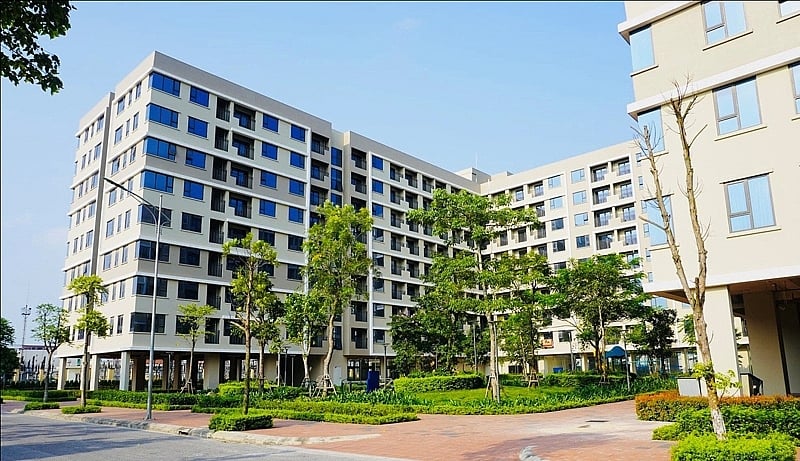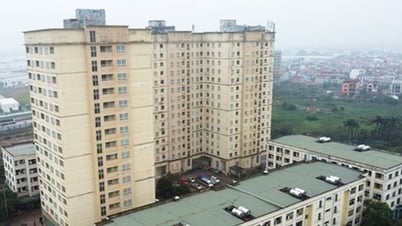Accordingly, the report of the Department of Planning and Architecture of Ho Chi Minh City (QHKT) stated that the requirement for all commercial housing construction investment projects in urban areas from type III and above to reserve land for social housing construction at a rate of 20% as prescribed by the Government is not suitable to reality.
Requiring all projects to reserve social housing land without basing on local housing development programs and plans such as land use planning, urban planning, economic and geographical conditions of each locality... may lead to a situation where this land fund is not invested, causing loss of urban aesthetics, wasting land resources and increasing housing prices.
Meanwhile, commercial housing construction investment projects have small land use scale, and reserving land for social housing investment is not feasible due to the lack of minimum area to invest in an independent social housing block, ensuring standards, construction regulations, architecture, and general landscape.
Such land scale is also not feasible if converted into low-rise social housing type, because special type and type I urban areas do not encourage this type to save land fund. At the same time, if this type is developed in commercial projects, urban areas with high value can potentially contain negative and unfair.

Regulations on land allocation for social housing are considered unreasonable in the current situation.
From the above shortcomings, the Department of Planning and Investment recommends that the Ministry of Construction promptly review, amend and supplement documents guiding the implementation of laws related to planning in accordance with the provisions of the Law on Planning.
Regarding existing laws, decrees, circulars guiding implementation, new planning standards and regulations, the Department of Planning and Investment proposes that the Ministry of Construction make specific regulations for the City as a special urban area with different management requirements compared to many provinces and cities with low urbanization density.
At the same time, it is proposed that the Ministry of Construction research and build a national information system and database on planning to provide synchronous, unified, complete, accurate and timely information for the work of planning establishment, appraisal, approval, adjustment and implementation.
In addition, this report also stated that, through reviewing the implementation process in the 2016-2021 period, the Department of Planning and Investment found that most of the zoning plans in the city that have been approved so far have not determined the location and scale of the land fund for social housing or have not been updated with social housing projects.
The cause of this problem is believed to come from the fact that the detailed construction planning projects at a scale of 1/2000 were approved before the Housing Law 2014 and Decree 100 came into effect. New social housing projects were approved after the approval of adjustments to the 1/2000 zoning plans in 2013, so they have not been updated in the zoning plans.
In particular, the review work to propose additional land area for social housing in the zoning plan is currently facing many obstacles and difficulties in forecasting local social housing demand and determining appropriate land allocation.
Source



![[Photo] Panorama of the cable-stayed bridge, the final bottleneck of the Ben Luc-Long Thanh expressway](https://vphoto.vietnam.vn/thumb/1200x675/vietnam/resource/IMAGE/2025/9/30/391fdf21025541d6b2f092e49a17243f)
![[Photo] President Luong Cuong receives President of the Cuban National Assembly Esteban Lazo Hernandez](https://vphoto.vietnam.vn/thumb/1200x675/vietnam/resource/IMAGE/2025/9/30/4d38932911c24f6ea1936252bd5427fa)
![[Photo] General Secretary To Lam, Secretary of the Central Military Commission attends the 12th Party Congress of the Army](https://vphoto.vietnam.vn/thumb/1200x675/vietnam/resource/IMAGE/2025/9/30/9b63aaa37ddb472ead84e3870a8ae825)
![[Photo] The 1st Congress of Phu Tho Provincial Party Committee, term 2025-2030](https://vphoto.vietnam.vn/thumb/1200x675/vietnam/resource/IMAGE/2025/9/30/1507da06216649bba8a1ce6251816820)
![[Photo] Solemn opening of the 12th Military Party Congress for the 2025-2030 term](https://vphoto.vietnam.vn/thumb/1200x675/vietnam/resource/IMAGE/2025/9/30/2cd383b3130d41a1a4b5ace0d5eb989d)


































































































Comment (0)